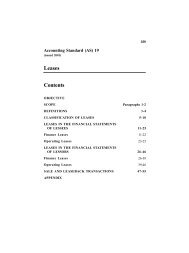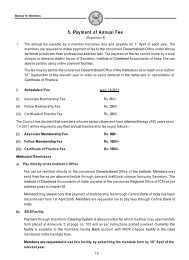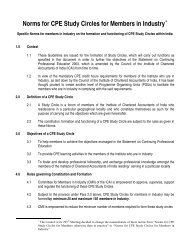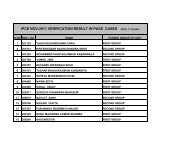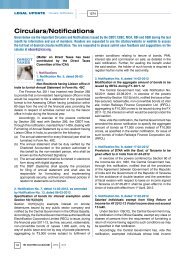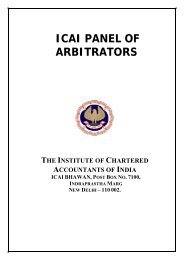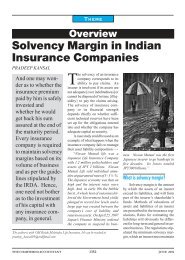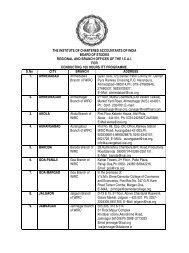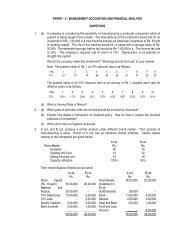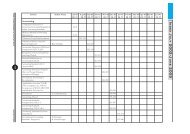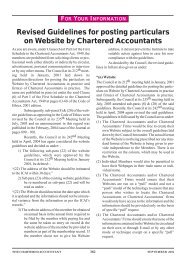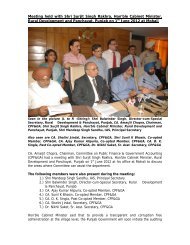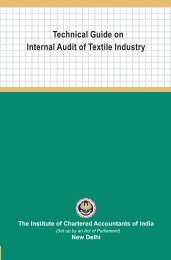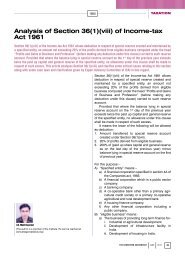The Chartered Accountant
The Chartered Accountant
The Chartered Accountant
Create successful ePaper yourself
Turn your PDF publications into a flip-book with our unique Google optimized e-Paper software.
LEGAL UPDATE<br />
LEGAL DECISIONS 1<br />
Direct Taxes<br />
Section 43A of the Income-tax Act, 1961 — Special Provisions consequential to Changes in rate of Exchange<br />
of Currency [Assessment Year 1993-94]<br />
For claiming deduction on account of foreign exchange rate fluctuation factual position is required<br />
Commissioner of Income Tax, Rajkot v. M/s Gujarat Siddhi Cement Ltd. (Supreme Court) 17 October, 2008<br />
<strong>The</strong> respondent/assessee claimed increased amount<br />
as deduction as investment allowance on account of<br />
increase in the cost of plant and machinery on account<br />
of exchange rate fluctuation. <strong>The</strong> assessing officer<br />
disallowed the claim on the ground that plant and<br />
machinery in respect of which there has been increase<br />
were installed in the earlier years. On appeal, the Commissioner<br />
upheld by the order of the Assessing Officer<br />
on the ground that no arguments were advanced and<br />
no factual details were furnished regarding the alleged<br />
fluctuation on account of foreign exchange rate.<br />
<strong>The</strong> Supreme Court held that on a bare reading of<br />
the provisions of Section 43A(1) the position is clear<br />
that it relates to the fluctuation in the previous year<br />
in question. If any extra benefit is taken the same has<br />
to be taxed in the year when the liability is reduced as<br />
provided in terms of Section 41(1)(a) Explanation 2.<br />
<strong>The</strong>refore, whenever there is fluctuation in any previous<br />
year, Section 43A (1) comes into play.<br />
On facts, the Court held that it would be appropriate<br />
to grant opportunity to the assessee to establish<br />
the factual position relating to fluctuation in foreign<br />
exchange rate. <strong>The</strong> matter was therefore, remitted to<br />
the Tribunal to consider whether assessee is justified<br />
in claiming deduction in the background of Section<br />
43A(1) as it stood then.<br />
<strong>The</strong> appeal was disposed of.<br />
Section 80-HH read with Section 80-I of the Income-tax Act, 1961 — Deductions – Profits and gains from<br />
newly established industrial undertakings or hotel business in backward areas<br />
Deduction under Sections 80-HH and 80-I is allowable as ship breaking activity gives rise to production of a<br />
distinct and different article<br />
Section 195 of the Income-tax Act, 1961 – Deduction at source – Other sums<br />
Usance interest is exempt from payment of income tax if paid in respect of ship breaking activity and thus assessee<br />
was not bound to deduct tax at source under section 195(1)<br />
Vijay Ship Breaking Corporation & Ors. v. Commissioner of Income Tax, Ahmedabad (Supreme Court) 1 October, 2008<br />
Issues before the Supreme Court were: (1) Whether<br />
appellant-assessee was entitled to deduction under<br />
Sections 80-HH and 80-I in respect of ship breaking<br />
activity undertaken by it and (2) Whether ‘usance<br />
interest’ partakes of the character of purchase price<br />
and, therefore, not liable to deduction at source under<br />
Section 195(1).<br />
As regards to deduction under Sections 80-HH and<br />
80-I the Supreme Court held that ship breaking activity<br />
gave rise to the production of a distinct and different<br />
article. Hence, deduction under Sections 80-HH<br />
and 80-I is allowable.<br />
As regards to deduction at source under Section<br />
195(1) the Supreme Court held that usance interest<br />
is exempt from payment of income tax if paid in respect<br />
of ship breaking activity. <strong>The</strong> assessee was not<br />
bound to deduct tax at source once Explanation-2<br />
to Section 10(15)(iv)(c) stood inserted as TDS arises<br />
only if the tax is assessable in India. Since tax was not<br />
assessable in India, there was no question of TDS being<br />
deducted by the assessee.<br />
<strong>The</strong> appeals were disposed of.<br />
Section 80-I of the Income Tax Act, 1961 - Deductions - Profits and gains from industrial undertakings after a<br />
certain date [Assessment Year 1993-94]<br />
Whether receipt of service charges was or was not directly linked with the manufacturing activity carried out in<br />
the industrial undertaking of the appellant<br />
Krishak Bharati Cooperative Ltd. v. Joint Commissioner of Income Tax (Supreme Court) 21 October, 2008<br />
1<strong>The</strong>se cases have been compiled and contributed by www.Indlaw.com. Readers are invited to send their comments on the selection of cases and their<br />
utility at eboard@icai.org. For the convenience of readers full text of these cases have been hosted on the website of the Institute at the link: http://<br />
www.icai.org/post.html?post_id=2583<br />
Edited by Journal Section ICAI<br />
THE CHARTERED ACCOUNTANT 997 DECEMBER 2008



